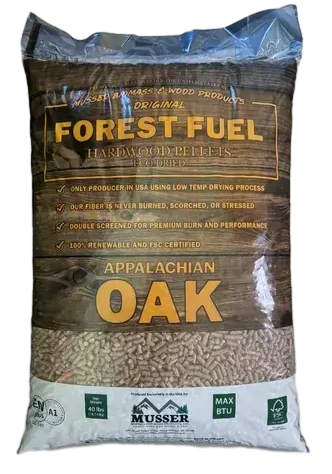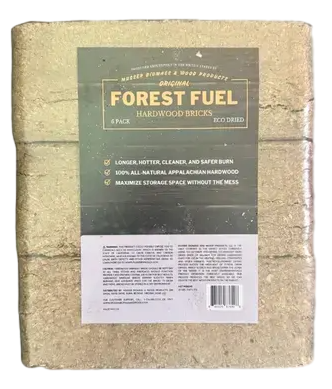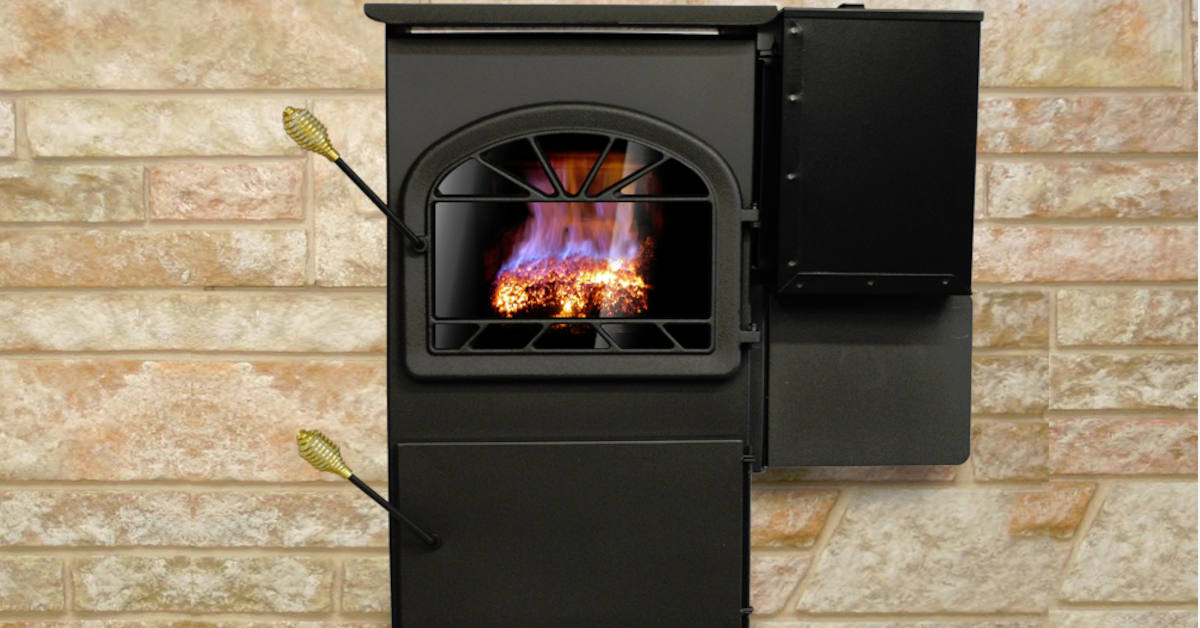

Introducing Bulls Supply, LLC’s latest offering: a premium line of wood pellet products crafted by Musser Biomass and Wood Products.
These wood pellets are designed to provide an eco-friendly, efficient, and sustainable heating solution for your home or business.
Why Choose Our Wood Pellets?
- Sustainability: Made from responsibly sourced wood, our pellets are an environmentally conscious choice.
- High Efficiency: With advanced drying technology, these pellets offer superior heat output and minimal ash production.
- Versatility: Ideal for heating, these pellets are perfect for stoves, boilers, and furnaces.
Musser Biomass and Wood Products, located in the heart of the Appalachian Mountains, uses state-of-the-art technology to ensure the highest quality and consistency in their wood pellets. Their commitment to sustainability and innovation makes them a trusted partner in providing renewable energy solutions.
Upgrade to Bulls Supply, LLC’s new wood pellet line today and experience the difference in quality and performance. Feel free to reach out if you need any more details or have other requests!
- Details
- By HoffmanWeb
Introducing Bulls Supply, LLC’s latest offering: a premium line of wood pellet products crafted by Musser Biomass and Wood Products.

Forest Fuel Oak Pellets (40 lbs. Bag)
Product Description
A Forest Brands original product. We offer a premium heating solution delivered in the form of responsibly sourced, eco-friendly pellets. Our product can be used in a variety of appliances for home heating systems. It is designed to generate maximum BTUs with minimum ash residue, making it stronger, cleaner, and safer than any of its competitors.
Product Description
-
Produced Using Low Temperature Drying Process
-
Fiber is Never Burned, Scorched, or Stressed
-
Double Screened to Ensure Premium Burn and Performance
-
100% Renewable and FSC Certified
Product Specifications
-
Material: Premium Appalachian Oak
-
Weight: 40lbs (18.14 kg)
-
-
Bag Size: W 19" x H 29"
These wood pellets are designed to provide an eco-friendly, efficient, and sustainable heating solution for your home or business.
Why Choose Our Wood Pellets?
- Sustainability: Made from responsibly sourced wood, our pellets are an environmentally conscious choice.
- High Efficiency: With advanced drying technology, these pellets offer superior heat output and minimal ash production.
- Versatility: Ideal for heating, these pellets are perfect for stoves, boilers, and furnaces.

Forest Brands Hardwood Bricks
(6 Brick Pack)
Product Description
A Forest Brands original product. Introducing our six-pack of hardwood heating bricks, the convenient and reliable solution for keeping your home cozy. Crafted from premium hardwoods, these bricks offer a longer burn time and higher heat output compared to traditional firewood. Experience efficient warmth and minimal ash with each clean-burning brick, perfect for cold winter nights and outdoor adventures alike.
Product Description
-
Longer, Hotter, Cleaner, and Safer Burn
-
Sourced From 100% Natural Appalachian Hardwood
-
Maximize Storage Space Without the Mess
Product Specifications
-
Material: 100% Natural Appalachian Hardwood
-
Weight: 20lbs (9 kg)
-
-
Bag Size: L 3.75" x W 9.5" x H 3"
Musser Biomass and Wood Products, located in the heart of the Appalachian Mountains, uses state-of-the-art technology to ensure the highest quality and consistency in their wood pellets. Their commitment to sustainability and innovation makes them a trusted partner in providing renewable energy solutions.
Upgrade to Bulls Supply, LLC’s new wood pellet line today and experience the difference in quality and performance. Feel free to reach out if you need any more details or have other requests!

When it comes to heating your home, understanding the energy efficiency of different fuel sources is crucial. Heat output, measured in British Thermal Units (BTUs), per ton of fuel is a key metric in determining which option is right for you. In this article, we'll compare BTUs per ton for various heating fuels, including anthracite coal, wood pellets, oil, corn, propane gas, natural gas, and electric. We'll also highlight the unique benefits of anthracite coal compared to other forms of heat.
Anthracite Coal: High BTUs, Low Emissions
Anthracite coal stands out as an efficient and environmentally friendly heating option. It delivers a remarkable 25 million BTUs per ton, making it one of the highest BTU-producing fuels available. This high energy content means that you'll need less coal to generate the same amount of heat compared to other fuels.
What sets anthracite apart is its low emissions profile. It burns cleanly with minimal smoke, particulate matter, and greenhouse gas emissions. Anthracite is also abundant and domestically sourced, reducing reliance on foreign energy imports.
Wood Pellets: Renewable, but Lower BTUs
Wood pellets are a popular renewable heating source, often used in pellet stoves and boilers. However, they produce fewer BTUs per ton compared to anthracite coal, typically ranging around 13.5 million BTUs per ton. While wood pellets are sustainable, they require more storage space and more frequent refilling compared to coal.
Heating Oil: A Standard Choice
Heating oil is a common choice for many homeowners. It delivers approximately 10 million BTUs per gallon, with one ton of oil equivalent to around 180 gallons. However, it produces higher greenhouse gas emissions and is subject to price fluctuations due to oil market dynamics.
Corn: A Novel but Less Efficient Option
Corn can be used as a heating source, particularly in agricultural areas. It offers around 13.6 million BTUs per ton, similar to wood pellets. However, its BTU output is lower than anthracite coal, and it requires specialized equipment for combustion.
Propane Gas and Natural Gas: Clean but Not as Efficient
Propane gas provides about 91,000 BTUs per gallon, and natural gas offers approximately 1,037 BTUs per cubic foot. While both are clean-burning and convenient, they have lower BTU outputs compared to solid fuels like coal. Moreover, their prices can fluctuate based on supply and demand.
Electric Heating: Energy-Intensive
Electric heating systems typically provide around 3,412 BTUs per kilowatt-hour (kWh). While electric heating is simple to install and can be efficient in certain scenarios, it often requires more energy to produce the same amount of heat as solid fuels like anthracite coal.
Conclusion:
When it comes to heating your home, anthracite coal shines as a high-BTU, low-emission, and domestically sourced option. Its impressive heat output of 26 million BTUs per ton outperforms many other heating fuels. Additionally, its cleanliness and abundance make it an excellent choice for those seeking both efficiency and environmental responsibility.
While other fuels like wood pellets, oil, corn, propane gas, natural gas, and electric heating have their advantages, anthracite coal offers a compelling combination of energy efficiency, sustainability, and affordability, making it a noteworthy option for modern homeowners looking to stay warm while minimizing their environmental impact.
Sources:
-
U.S. Energy Information Administration (EIA): The EIA provides comprehensive data on energy sources, including BTU values and comparisons for various fuels. Their website (eia.gov) offers reports, publications, and statistical information.
-
National Renewable Energy Laboratory (NREL): NREL conducts research on renewable energy sources, including wood pellets and their energy content. Their website (nrel.gov) may have relevant reports and data.
-
American Coalition for Clean Coal Electricity (ACCCE): Organizations like ACCCE may provide information on coal, including anthracite coal, its BTU values, and comparisons with other fuels.
-
Heating Oil Industry Organizations: Associations related to heating oil, such as the National Oilheat Research Alliance (NORA), often publish data on heating oil's energy content and efficiency.
-
Propane and Natural Gas Associations: Organizations representing propane and natural gas industries may provide information on their respective energy content and comparisons with other fuels.
-
Department of Energy (DOE): The DOE's website (energy.gov) offers a wealth of information on various energy sources, including BTU values and comparisons.
-
Local Utility Providers: Local utility companies often provide information on energy sources and their efficiencies for residential heating.
-
Academic Publications: Scientific journals and research papers may also contain studies and analyses of the energy content and efficiency of different heating fuels.

Introduction
Coal stoves have long been valued for their ability to provide efficient and consistent heat. However, even with this inherent efficiency, there are steps you can take to further optimize your coal stove's performance. In this article, we'll explore valuable tips to help you increase the efficiency of your coal stove, making it an even more cost-effective and eco-friendly heating option.
- Choose the Right Coal
Not all coal is created equal. The type of coal you use can significantly impact your stove's efficiency. Anthracite coal is known for its high carbon content, low ash production, and excellent heat output. Choosing high-quality anthracite coal can make a noticeable difference in your stove's performance.
Properly Size Your Stove
Select a coal stove that is appropriately sized for your space. An oversized stove can lead to inefficient burning at lower heat settings, while an undersized stove may struggle to heat your home adequately. Consult with a professional to determine the right stove size for your needs.
Ensure Adequate Draft
Adequate draft is crucial for efficient coal combustion. Check the chimney and stove pipe for obstructions or creosote buildup that can hinder proper airflow. Ensure that the chimney is tall enough and free from overhanging trees or buildings that might disrupt the draft.
Regularly Clean the Stove
Cleaning your coal stove is essential for maintaining efficiency. Remove ash and clinkers from the firebox and ash pan regularly. A clean stove allows for better air circulation, which, in turn, improves combustion efficiency.
Use a Coal Stove Thermometer
Invest in a coal stove thermometer to monitor the stove's operating temperature. This helps you find the ideal balance between too much and too little heat output, ensuring optimal efficiency.
Adjust Air Controls
Most coal stoves have adjustable air controls that regulate the combustion process. Experiment with these controls to find the right balance between primary (intake) and secondary (exhaust) air for efficient burning. Proper adjustments can help you achieve more complete combustion and less wasted heat.
Use a Stove Fan
A stove fan, also known as a stove blower or circulator fan, helps distribute heat more evenly throughout your space. This can reduce temperature variations and improve overall comfort while ensuring that heated air reaches all corners of the room.
Insulate and Seal Your Home
A well-insulated and sealed home retains heat better, reducing the workload on your coal stove. Consider improving insulation, sealing gaps, and upgrading windows and doors to enhance overall energy efficiency.
Schedule Regular Maintenance
Finally, don't neglect regular maintenance. Professional inspections and cleanings can identify and address issues that might be hampering your coal stove's efficiency. A well-maintained stove operates at its best.
Conclusion
Increasing the efficiency of your coal stove involves a combination of proper fuel selection, stove maintenance, and smart operating practices. By implementing these tips, you can make the most of your coal stove's heating potential, ensuring that it provides reliable warmth while saving you money and reducing environmental impact. Enjoy the cozy comfort of your coal stove at its peak performance while contributing to a greener and more efficient home heating system.

